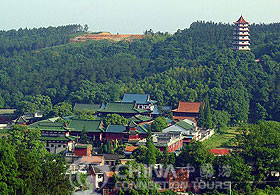Jiangxi Province lies in the southeastern part of China, on the southern bank of the middle Yangtze River. It includes an area of more than 160,000 square kilometers It is bordered by hills and low mountains, the land generally sloping towards Poyang Lake in the north which is the largest freshwater lake in China. Hills and mountains account for 60 per cent of the province's total area. The Mufu, Jiuling, Wugong and Wanyang mountains lie in the west; the Dayuling and Jiulian mountains in the south; the Huaiyu and Wuyi mountains in the east; and Mountain Lushan in the north. The Jian Basin in the middle and the Southern Jiangxi Basin in the south are major farming areas. With numerous rivers and streams, fertile soil and a dense population, it is known as the "granary south of the Yangtze River."
Jiangxi has a sub-tropical climate, warm and humid. It has an average annual temperature of about 3 to 9°C (34-45F) in January and 27 to 31°C (78-88F) in July, and an average annual rainfall of 1,300-2,000 mm. Nanchang is one of the hottest cities in China.
Since ancient times, Jiangxi has been a center of education and culture. Many talented natives have become known nationally for their accomplishments. These include writers, poets, philosophers, educators, dramatists, scientists, painters, engineers, and calligraphers.
Although little known outside of the province, Jiangxi cuisine is rich and distinctive. Flavors are some of the strongest in China, with heavy use of chili peppers and pickled and fermented products.
Jingdezhen is widely regarded as the producer of the best porcelain in China.
Jiangxi has a population of 82.7 million, of which 15.4 per cent live in the cities and the rest in the rural areas. Jiangxi is over 99% Han Chinese. Minorities include Hui and Zhuang. The Hakka, a Han Chinese people with their own distinctive identity, inhabit the southern parts of the province.
This province has a glorious revolutionary history. Its places of historical interest include Jinggangshan, Ruijin, Nanchang and Anyuan.
 Near the northern port city of Jiujiang is the well-known (and pricey) resort area of Mount Lushan. Also near the city are Donglin (East Wood) Temple and Tiefo (Iron Buddha) Temple, two important Buddhist temples. Near the small city of Yingtan is the resort area Longhushan which purports to be the birthplace of Taoism and hence has great symbolic value to Taoists. The region has many interesting temples, cave complexes, mountains and villages. It is considered by many to be the best-kept secret of Jiangxi tourism.
Near the northern port city of Jiujiang is the well-known (and pricey) resort area of Mount Lushan. Also near the city are Donglin (East Wood) Temple and Tiefo (Iron Buddha) Temple, two important Buddhist temples. Near the small city of Yingtan is the resort area Longhushan which purports to be the birthplace of Taoism and hence has great symbolic value to Taoists. The region has many interesting temples, cave complexes, mountains and villages. It is considered by many to be the best-kept secret of Jiangxi tourism.
The Lushan National Park has been a UNESCO World Heritage Site since 1996.

